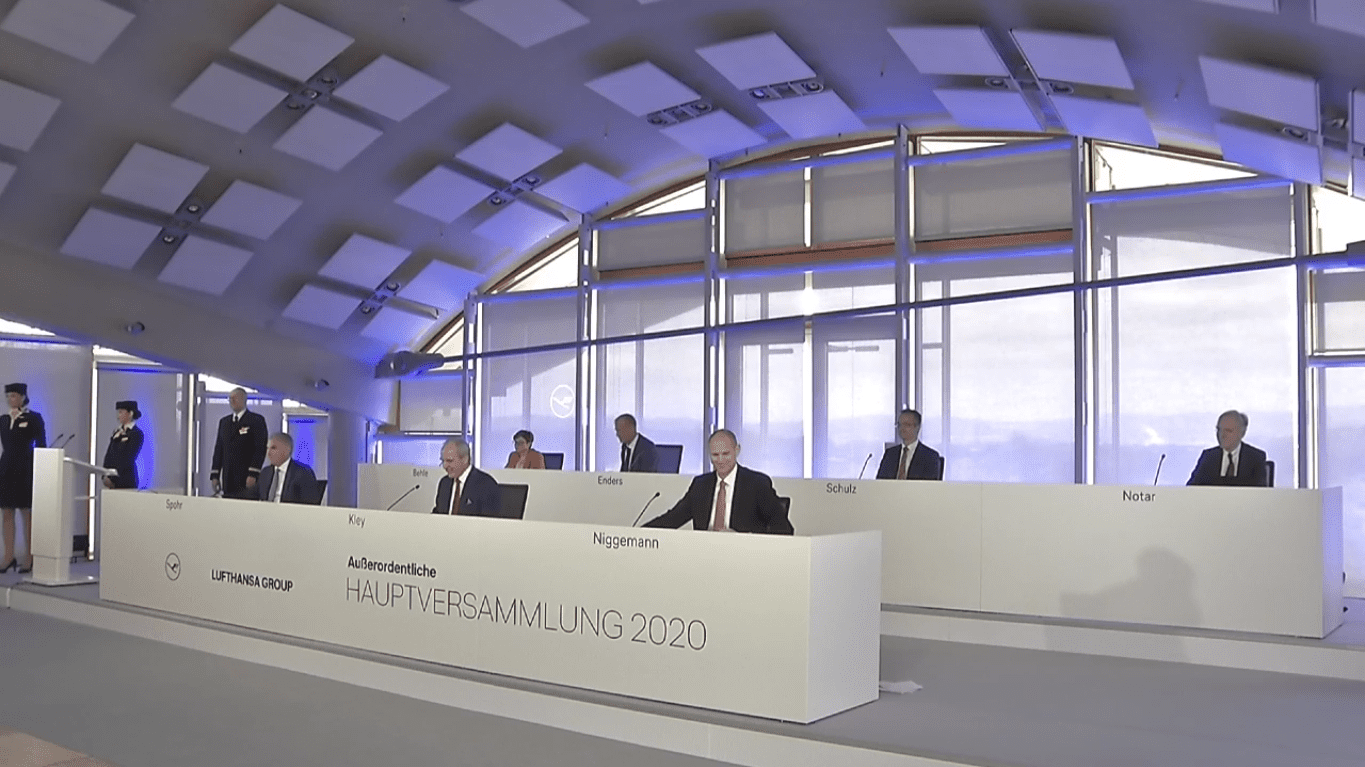Skift Take
Regrets? Lufthansa has a few. But its supervisory board, and now shareholders, are simply making the most of a bad situation by accepting the German government's bailout conditions.
No stone was left unturned Thursday during Lufthansa’s six-hour long virtual extraordinary general meeting in which shareholders formally voted to accept a $10 billion bailout package from the German government.
The result may not have come as a surprise following majority shareholder Heinz Hermann Thiele’s last-minute backing for the deal. He owns a 15.5 percent stake.
“This is truly an extraordinary general meeting,” noted Karl-Ludwig Kley, chairman of its supervisory board, in his opening speech. “It is of historic impact. It’s importance reminds us of (Lufthansa’s) foundation in 1955, and privatization in 1997. This special importance has been magnified by Heinz Hermann Thiele. He’s fine with this agreement.”
So what does the agreement mean? The bailout includes $336 million equity participation through the subscription of new shares by the state (corresponding to 20 percent of the share capital).
Then there’s a $5.3 billion silent participation with the features of a non-convertible equity instrument, and a $1.1 billion silent participation with the features of a convertible debt instrument.
The stabilization measures are supplemented by a syndicated credit facility of up to $3.3 billion with the participation of German state bank KfW and private banks with a term of three years.
The recapitalization is being financed by the Economic Stabilisation Fund (Wirtschaftsstabilisierungsfond), a special fund established by Germany to help German companies affected by the coronavirus outbreak.
As during the first-quarter earnings call, on June 3, the airline emphasized that the deal really was a last resort.
Setting the Scene
“We simply don’t have any money,” Kley continued. “We’ve been living on reserves that we’ve been able to amass during the good years. Soon most of it will be gone, and insolvency is looming.
“If you approve of a participation of the Economic Stabilization Acceleration Act, we will be able to work on the recovery of Lufthansa and restore success. There will be no insolvency.”
He added the supervisory board agreed to the proposition, despite misgivings. “For the government, it is quite a good deal, and as taxpayers we are quite pleased with that as well. As members of Lufthansa, it is a tremendous burden,” Kley said.
Later, shareholders also had the chance to voice their own misgivings during a five-hour Q&A session. Again, many had themes that were outlined in detail during that first-quarter earnings call earlier in the month.
The main concern was their shares were being devalued: why couldn’t the money have been raised by capital markets? In short, Lufthansa replied the total amount needed was too large via that route, and with the clock ticking there simply wasn’t enough time.
Kley reiterated the bailout was a quick fix, and that the while there is interest to pay on the loan, the interest rates start out relatively low. “The state is only helping to stabilize Lufthansa, a swift exit of the state after stabilization is part of the foundation upon which we have agreed these measures,” he said, adding the government would have no political influence — “the state is not a better entrepreneur, this was demonstrated before and after 1997,” he said.
There were also complaints about how the bailout conditions forced Lufthansa to transfer to one competitor each at the Frankfurt and Munich airports up to 24 take-off and landing rights.
In time, Lufthansa could technically win these back.
“Did we want another solution? Yes, but imagine you are responsible for over 100,000 employees. You have no alternatives. What we’ve reached was limited — the supervisory board thinks this is the maximum,” Kley said.
Precious Assets
Customers were earlier described as Lufthansa’s most precious assets, and it apologized for delays in processing refunds.
But shareholders wanted clarification that paying out refunds wouldn’t cripple the airline. Carsten Spohr, CEO of Lufthansa, said hundreds of millions of dollars were being paid back per month. Up until mid June, Lufthansa paid out $1.1 billion in compensation, and expected to pay out a further $1.2 billion.
Spohr also pledged all refunds would be returned this summer.
“Many have been disappointed and upset because it’s taking very long to reimburse their cancelled tickets. I would like to apologize, and ensure you they will make get their money back. We have increased funds for that, and we will have paid back all claims within six weeks.”
What Next?
With the deal now finalized, Lufthansa will now look to cut some 26,000 jobs across its different airlines and divisions, and it already has a cost-saving program in place.
“We have made most progress with the flight attendants union (UFO), and we will reduce personnel unit costs by 17 percent… we are on course to conclude a similar agreement with the pilots union,” Spohr said.
However, talks with the verdi trade union were “more disappointing” and he said the airline urgently needed to progress to avoid making excess staff redundant through job cuts and involuntary layoffs.
Lufthansa has, finally, managed to buy more time.
The Daily Newsletter
Our daily coverage of the global travel industry. Written by editors and analysts from across Skift’s brands.
Have a confidential tip for Skift? Get in touch
Tags: coronavirus, germany, lufthansa, transport + airlines
Photo credit: Lufthansa held an extraordinary general meeting June 25, which was streamed live, where shareholders voted to accept a bailout package.
